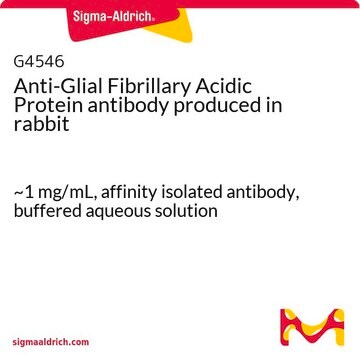G3893
Anti-Glial Fibrillary Acidic Protein Antibody
mouse monoclonal, G-A-5
Synonym(s):
Anti Gfap, Anti-Gfap, GFAP Antibody - Monoclonal Anti-Glial Fibrillary Acidic Protein (GFAP) antibody produced in mouse, Gfap Antibody, Glial Fibrillary Acidic Protein Antibody, Anti-GFAP
About This Item
Recommended Products
product name
Monoclonal Anti-Glial Fibrillary Acidic Protein (GFAP) antibody produced in mouse, clone G-A-5, ascites fluid
biological source
mouse
Quality Level
conjugate
unconjugated
antibody form
ascites fluid
antibody product type
primary antibodies
clone
G-A-5, monoclonal
species reactivity
rat, human, pig
technique(s)
immunoblotting: suitable
immunocytochemistry: suitable
immunohistochemistry: 1:400 using rat brain sections (alcohol-fixed)
indirect immunofluorescence: suitable
microarray: suitable
isotype
IgG1
UniProt accession no.
shipped in
dry ice
storage temp.
−20°C
target post-translational modification
unmodified
Gene Information
human ... GFAP(2670)
rat ... Gfap(24387)
Related Categories
General description
The isotype is determined using ImmunoTypeTM Kit (Product Code ISO-1) and by a double diffusion immunoassay using Mouse Monoclonal Antibody Isotyping Reagents (Product Code ISO-2).
Intermediate filaments (IFs) with characteristic 10 nm diameter are a distinct class of molecularly heterogenous cytoskeletal filaments defined by ultrastructural, immunological, and biochemical criteria. Intermediate filaments differ significantly from the other cytoskeletal elements of the cell, namely microtubules and microfilaments, and are components of most eukaryotic cells. GFAP (molecular weight of 50 kDa) is the cell specific IF protein in astrocytes.
Specificity
Immunogen
Application
The antibody was used as a primary antibody in immunocytochemistry analysis:
- of primary cerebral microvascular EC cultures to study the effect of microglia on the BBB (blood-brain barrier) and its primary constituents
- to study the wound healing effects of matrix metalloproteinase-2 that promote recovery after spinal cord injury
- to study the negative regulation of embryonic neural progenitor cell proliferation by Toll-like receptor 3
Biochem/physiol Actions
Physical form
Storage and Stability
Disclaimer
Not finding the right product?
Try our Product Selector Tool.
antibody
recommended
related product
Storage Class Code
10 - Combustible liquids
WGK
WGK 3
Flash Point(F)
Not applicable
Flash Point(C)
Not applicable
Certificates of Analysis (COA)
Search for Certificates of Analysis (COA) by entering the products Lot/Batch Number. Lot and Batch Numbers can be found on a product’s label following the words ‘Lot’ or ‘Batch’.
Already Own This Product?
Find documentation for the products that you have recently purchased in the Document Library.
Customers Also Viewed
DYSMORPHIC FEATURES ASSOCIATED WITH
17q21.31 MICRODELETION SYNDROME
Articles
Frequently asked questions about neural stem cells including NSC derivation, expansion and differentiation.
Our team of scientists has experience in all areas of research including Life Science, Material Science, Chemical Synthesis, Chromatography, Analytical and many others.
Contact Technical Service











